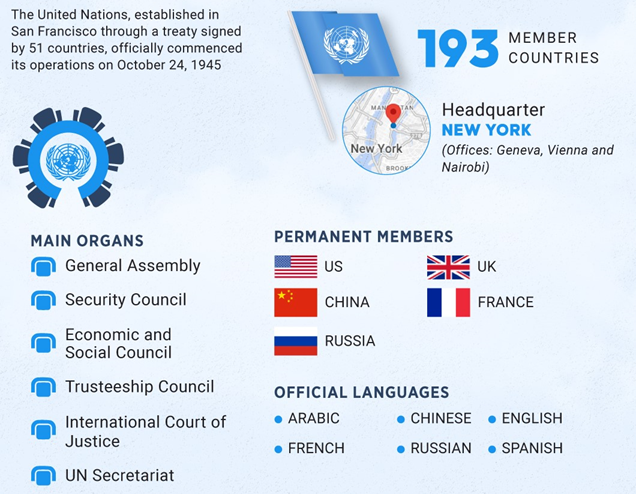THE QUESTION OF PALESTINE’S U.N. MEMBERSHIP
Relevance: GS 2 – Effect of policies and politics of developed and developing countries on India’s interests
Why in the News?
- Recently, the United Nations General Assembly (UNGA) supported a Palestinian bid for full UN membership.
- It recognized Palestine as qualified to join the UN.
- This vote acted as a global survey of support for Palestinian full UN membership.
- Full UN membership for Palestine would effectively recognize it as a state.
About Palestine’s Membership
- Israel’s war on Gaza has raised numerous ethical, political, and diplomatic questions.
- A key diplomatic development is Palestine’s renewed application for UN membership.
- This is not the first time Palestine has attempted to obtain UN membership.
- In 2011, its request was also opposed by the veto-bearing US in the UN Security Council.
- Since then, Palestine has held only non-member observer status.
- Palestine’s quest for membership is stuck at the UN Security Council (UNSC).
- This is mainly due to the geopolitical calculations of the US, which argued that membership should follow, not precede, a negotiated solution to the conflict.
- In April, the UNSC failed to agree on Palestine’s request due to a lone veto by the US, a permanent member.
- Following this, on May 10, 2024, the UNGA overwhelmingly adopted a resolution affirming Palestine’s eligibility for full UN membership.
- The UNGA recommended the UNSC reconsider the matter favorably.
- Following this, on May 10, 2024, the UNGA overwhelmingly adopted a resolution affirming Palestine’s eligibility for full UN membership.
Norms and Criteria for UN Membership
- The UN requires membership seekers to be “peace-loving” states.
- Applicants must be able and willing to carry out the obligations of the UN Charter.
- Criteria are liberally interpreted, but procedural thresholds for admission are stringent.
- Admission is influenced by the political exigencies of the five permanent members (P5) of the UN Security Council (UNSC).
- Procedural Thresholds
- Membership applications need a recommendation from the UNSC without any opposition from the P5.
- A negative vote (veto) from any P5 member blocks the recommendation.
- No veto power exists in the UNGA; decisions require a two-thirds majority.
Legal Precedents
- During the Cold War, many admission requests stalled in the UNSC.
- The UNGA sought the World Court’s opinion on whether it could admit states without the UNSC’s recommendation.
- In 1948, the Court ruled that a UNSC recommendation is a prerequisite for UNGA admission.
- Following the World Court ruling, the UNSC recommended all pending applications, leading to a steady increase in membership from 51 to 193.
- UN membership is seen as confirmation of sovereign statehood for newly independent countries.
Case of Mongolia
|
India’s Approach
- India supported the May 2024 UNGA resolution favoring Palestine’s UN membership.
- India believes membership status could enhance the prospects of a two-state solution to the Israel-Palestine conflict.
- India’s stance aligns with the Nehruvian era’s approach:
- UN membership should be open to all state applicants without discrimination.
- India has never opposed any country’s UN membership.
- India supported Pakistan’s admission in 1947 and the representation of the People’s Republic of China in 1971, despite border conflicts with China.
- Context of Global Politics
- The US and the former USSR/Russian Federation have blocked many UN membership applications.
- China has also vetoed membership applications, such as Bangladesh’s application after China joined the UNSC in 1971.
The Way Forward
- UNSC and US Influence: Palestine cannot assume full membership without the approval of the UNSC and the US.
- Geopolitical Concerns: China and Russia fear bypassing the UNSC might set a precedent for Taiwan or Kosovo’s admission.
- US Veto Scenario:
- Less likely but possible: The US could refrain from using its veto or abstain from voting to express displeasure with Israel’s actions in Gaza.
- This could pave the way for UNGA’s approval of Palestine’s membership.
- Potential Israeli Response: Israel might protest and quit the UN.
- If the UNSC stalemate continues, the UNGA could consider excluding Israel from its deliberations.
- Historical Precedents: The UNGA has previously barred participation from South Africa during apartheid and the Serb Republic of Yugoslavia during ethnic cleansing.
- These actions fall short of suspension or expulsion, which require UNSC recommendation.
- Enhancing Palestinian Participation:
- Increasing participatory privileges for Palestine, short of voting rights in the UNGA and eligibility for major UN organs, could be considered.
- Such steps would signal that might does not make right in contemporary international relations.
Alternative Articles
https://universalinstitutions.com/indias-support-for-palestines-un-membership/
https://universalinstitutions.com/permanent-status-on-palestine-and-the-un/
Source: https://www.thehindu.com/opinion/op-ed/the-question-of-palestines-un-membership/article68225212.ece
Mains question
Discuss the implications of the UN General Assembly’s support for Palestine’s full membership bid and the geopolitical challenges in the UN Security Council. What lessons can India draw for its foreign policy? (250 words)




